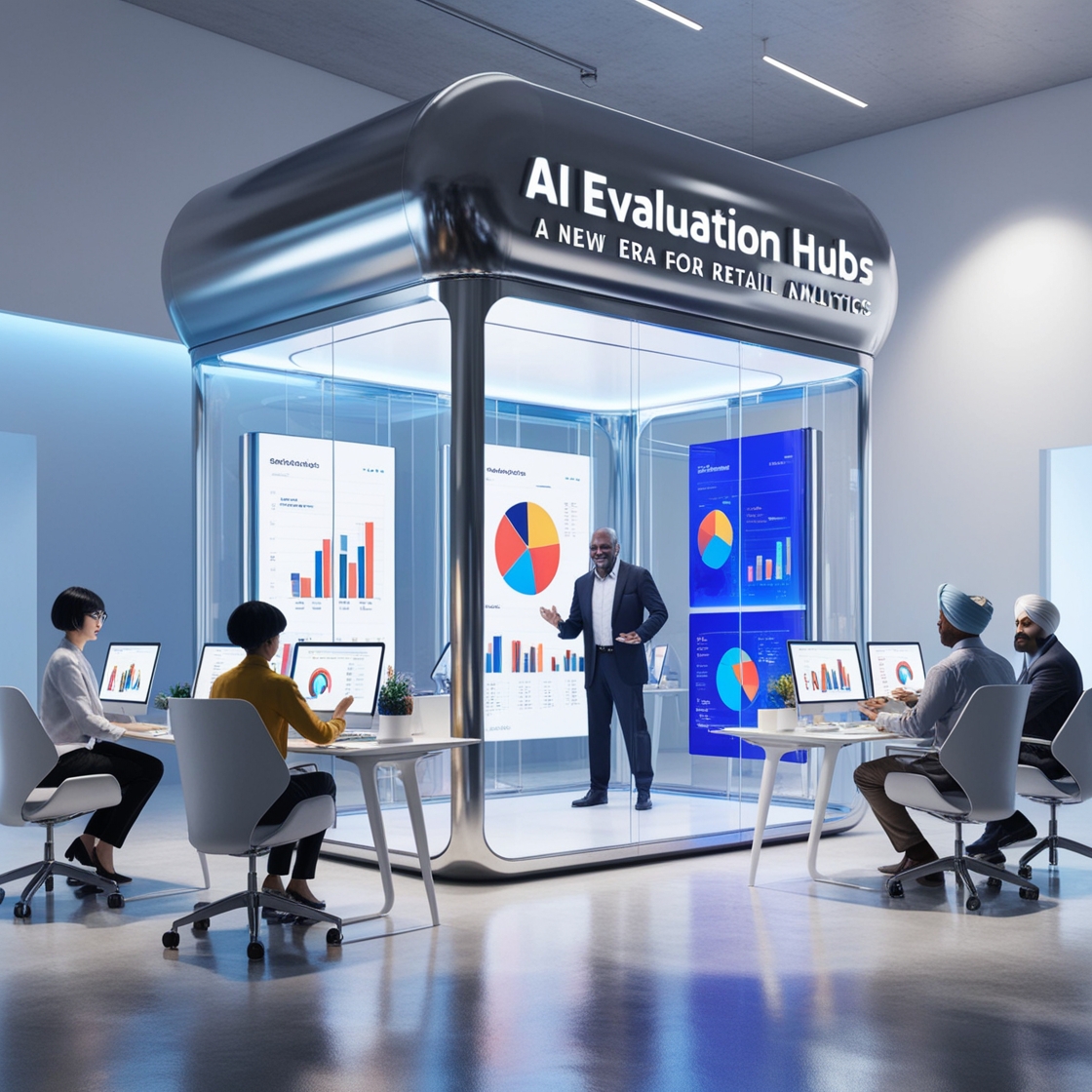Introduction
In the ever-evolving landscape of retail, data-driven decision-making has become crucial for success. Traditional retail analytics often struggled with limitations in data processing and predictive capabilities. Enter AI Evaluation Hubs—a transformative force in retail analytics. These hubs harness artificial intelligence to provide deeper insights, streamline operations, and enhance overall business performance. Let’s explore how AI Evaluation Hubs are reshaping retail analytics and what makes them a game-changer for retailers.
What are AI Evaluation Hubs?
Definition and Concept
AI Evaluation Hubs are centralized platforms designed to integrate and analyze vast amounts of retail data using advanced artificial intelligence technologies. They act as the brain behind retail analytics, processing data from various sources to deliver actionable insights and predictions. These hubs utilize machine learning algorithms to evaluate trends, consumer behaviors, and operational efficiencies in real time.
How They Operate
The core operation of AI Evaluation Hubs involves aggregating data from multiple sources, such as sales transactions, customer interactions, and inventory levels. The AI algorithms then analyze this data to identify patterns, forecast trends, and provide recommendations. This process allows retailers to make informed decisions based on comprehensive, up-to-date information.
The Importance of AI Evaluation Hubs in Retail
Enhancing Data Accuracy
One of the significant advantages of AI Evaluation Hubs is their ability to improve data accuracy. By utilizing sophisticated algorithms, these hubs minimize human error and ensure that the data used for decision-making is precise and reliable.
Improving Decision-Making
AI Evaluation Hubs empower retailers with predictive insights that go beyond historical data analysis. By forecasting future trends and consumer behaviors, retailers can make proactive decisions, such as adjusting inventory levels or tailoring marketing strategies, to better meet customer needs.
Core Features of AI Evaluation Hubs
Real-Time Analytics
Real-time analytics is a standout feature of AI Evaluation Hubs. Retailers can access up-to-the-minute information on sales performance, customer behavior, and market trends, allowing them to respond swiftly to changes and opportunities.
Predictive Analytics
Predictive analytics leverages historical data and AI algorithms to forecast future trends. This capability helps retailers anticipate customer demands, optimize inventory levels, and plan marketing campaigns more effectively.
Integration with Existing Systems
AI Evaluation Hubs are designed to seamlessly integrate with existing retail systems, such as POS systems and CRM platforms. This integration ensures a smooth transition and allows for a unified view of all relevant data.
Benefits of AI Evaluation Hubs for Retailers
Better Customer Insights
AI Evaluation Hubs provide retailers with a deeper understanding of their customers. By analyzing purchasing patterns, preferences, and feedback, retailers can personalize their offerings and enhance the overall customer experience.
Increased Sales and Revenue
With accurate forecasts and insights, retailers can optimize their inventory, reduce stockouts, and improve sales strategies. This optimization leads to increased revenue and a more efficient use of resources.
Streamlined Operations
AI Evaluation Hubs help streamline retail operations by automating data analysis and reporting processes. This automation reduces the time and effort required for manual analysis, allowing staff to focus on more strategic tasks.
Challenges and Considerations
Data Privacy and Security
While AI Evaluation Hubs offer numerous benefits, they also raise concerns about data privacy and security. Retailers must ensure that they comply with data protection regulations and implement robust security measures to safeguard customer information.
Implementation Costs
The initial investment in AI Evaluation Hubs can be significant. Retailers need to weigh the costs against the potential benefits and consider long-term ROI when deciding to implement these systems.
Technical Complexity
The integration and maintenance of AI Evaluation Hubs can be complex, requiring specialized knowledge and skills. Retailers may need to invest in training or hire experts to effectively manage and utilize these systems.
Case Studies
Example 1: Enhancing Inventory Management
Retailers who implemented AI Evaluation Hubs saw dramatic improvements in inventory management. By analyzing sales patterns and predicting demand, they were able to optimize stock levels, reduce excess inventory, and avoid stockouts.
Example 2: Optimizing Marketing Campaigns
Another success story involves optimizing marketing campaigns. AI Evaluation Hubs provided insights into customer preferences and behavior, allowing retailers to create more targeted and effective marketing strategies, resulting in higher engagement and conversion rates.
Future Trends in AI Evaluation Hubs
Evolution of AI Technologies
The future of AI Evaluation Hubs looks promising with ongoing advancements in AI technologies. Future developments may include more sophisticated algorithms, enhanced predictive capabilities, and improved user interfaces.
Impact of Emerging Technologies
Emerging technologies, such as augmented reality and blockchain, may also influence the evolution of AI Evaluation Hubs. These technologies could further enhance data analysis capabilities and provide new ways to interact with customers.
Conclusion
AI Evaluation Hubs represent a new era in retail analytics, offering advanced capabilities that drive better decision-making and operational efficiency. By leveraging real-time and predictive analytics, retailers can gain valuable insights, optimize their operations, and ultimately enhance their business performance. As AI technology continues to evolve, the potential for these hubs to revolutionize the retail industry is immense. Retailers who embrace this innovation will be well-positioned to thrive in an increasingly competitive market.
FAQs
What is the primary function of an AI evaluation hub?
An AI evaluation hub integrates and analyzes retail data using artificial intelligence to provide actionable insights and predictions that help retailers make informed decisions.
How do AI evaluation hubs enhance retail analytics?
AI evaluation hubs enhance retail analytics by offering real-time and predictive insights, improving data accuracy, and enabling more informed decision-making.
What are the main benefits of using AI in retail?
The main benefits include better customer insights, increased sales and revenue, and streamlined operations.
What challenges might retailers face when implementing AI evaluation hubs?
Challenges include data privacy and security concerns, high implementation costs, and technical complexity.
How can retailers prepare for the future of AI in retail analytics?
Retailers can prepare by staying updated on technological advancements, investing in AI training, and ensuring compliance with data protection regulations.
